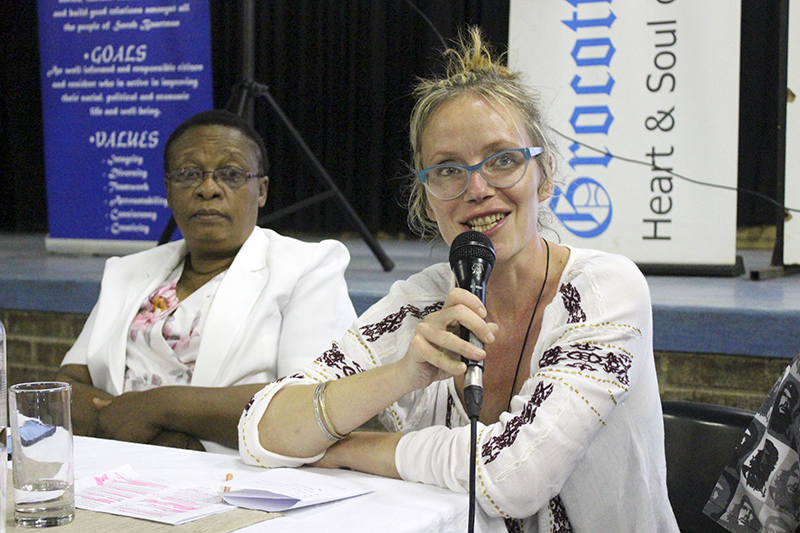“People mustn’t feel judged when they use our services,” Eastern Cape Health Superintendent General Dr Thobile Mbengashe told a small but engaged audience at the ‘Youth and wellness’ public debate in BB Zondani Community Hall on Wednesday night.
The event was the second in the #TheDebate2019 series – a partnership between Grocott’s Mail, Radio Grahamstown, Rhodes Music Radio (RMR), Rhodes School of Journalism and Media Studies and the Rhodes Department of Politics and International Studies. This collective hosted debates in Makana leading up to the 2016 local government elections.
#TheDebate2019 is a series of six public events, once a month, that aim to both educate voters, as well as air the big national issues in the local space. These include Land; Education; Economy; Health; Safety and security; Governance and IGR. The intention is to encourage informed participation by Makana residents in the 2019 national election. The debates take place in different community venues across the city and the municipality.
Around 66% of Makana’s population is youth, with dozens of schools and two tertiary institutions being a major part of the area’s socio-economic make-up. For this reason the theme was ‘Youth and wellness: does public health work for you?’
On the panel with Mbengashe were the Eastern Cape Department of Health’s Makana Sub District Manager Nikelwa Kanise and Raphael Centre Manager Anne Loeffler.
The event started with playbacks of accounts by three young women of humiliating experiences at local clinics. In one case a nurse told her she was too young for contraceptives; in another, the nurse insinuated she was promiscuous, saying, “Oh, so you’re getting ready for the festive season?”
While physical health was discussed, in particular the prevention and management of HIV/Aids and STIs, what emerged from discussions among participants from the floor and the panel was that paramount for young people was their mental well-being.
“There need to be things for young people to do – choirs, sports teams, youth clubs,” said researcher Nicola Graham. “We talk about choices, but what choices are there if the only way to be a young person is to drink and have sex?”
The question came up again when Grocott’s Mail’s own Azlan Makalima spoke about the high-risk “pens-down” (post-exam) activities that many school children engage in at the end of the year.
Was the Health Department speaking to local government and Social Development about alternative activities for teenagers during the school holidays?
UPSTART Youth was well represented and
Chelsea Moses argued that even where those activities and facilities exist – “At the Joza Youth Hub there are five organisations young people can participate in” – there will still be people who think there are better ways to spend their time.
“It’s not that no one is doing things for them,” Chelsea said. “I think the solution is for us youth to make our own organisations – to listen to each other and find our own solutions.”
It was a suggestion that fitted well with Loeffler’s emphasis on social well-being as a precursor of physical health.
“It’s easier to behave in ways that will keep you healthy if you have a sense of meaning and purpose in your life,” she said. “What we are missing in our town is accessible mental health care.”
Kanise spoke from her years of experience in public health, and speaking about high-risk behaviours, emphasised that young people should make the right choices.
Mbengashe elaborated on the theme, saying, “Every young person has the right to make a mistake – but they also have the right to another chance of survival.”
He emphasised how important young people were to the success of the country’s National Development Programme.
“Youth and development are core to the NDP,” Mbengashe said. “As young people, quality education and quality health care are essential for you to achieve your best.”
Addressing concerns about the quality of treatment at clinics, Mbengashe emphasised that the public should expect reasonable waiting times, clean facilities and proper treatment by staff, among their rights.
“Our biggest challenge is to be responsive to the legitimate expectations of the community,” Mbengashe said. Community representatives on clinic committees were key to monitoring clinic performance and conveying complaints.
The Department’s call centre allowed for anonymous complaints, as did the Presidentail complaints line. “If someone complains [from within my jurisdiction]via the Presidential hotline, it comes straight through to me and I have to respond,” he said.
He spoke about the NDP goal of an Aids-free generation by 2021 and said that key to this was the programme to prevent mother-to-child transmission. “No child should be born with HIV,” he said.
The debate was preceded by a round-table discussion among local NGOs who work with young people and the SG.
The next in #TheDebate2019 series is on 21 November in Noluthando Hall and the topic is safety and security.


